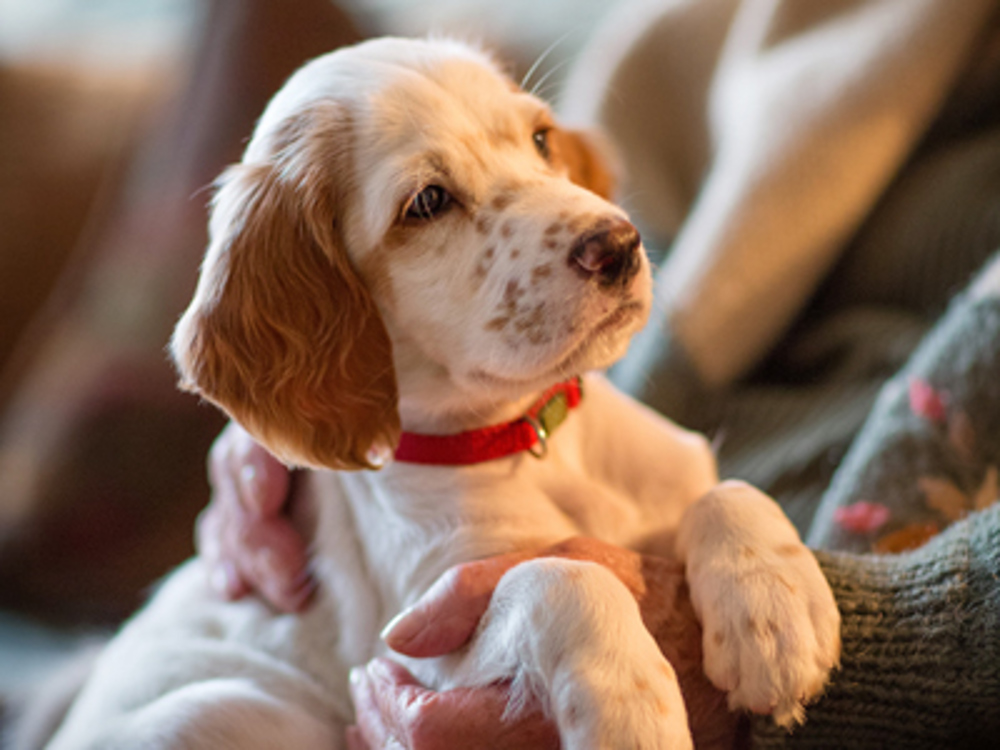
Until puppies know how to behave, are reliably toilet trained and have gone through the 'exploring by using their teeth' stage (at about 6 months of age), it is better to keep them closely supervised or contained in a 'dog proof' environment. This means no access to:
- carpets
- chemicals
- exposed electrical wiring
- expensive furniture
Make sure they have easy access to the garden and that they can't escape. If you're not sure if the garden is escape proof, only take them out on their lead.
Important topics to be aware of
Creating a routine
During the first few months, puppies really benefit from a good routine, so get into the habit of feeding your puppy at regular intervals. Take them outside as soon as they wake up, after their mealtimes and every hour or two.
Be sure to schedule in 'play time', and 'quiet time'. Your puppy needs to learn to how to settle quietly, as well as how to keep themselves occupied with a chew or their toys.
Going into the garden and toilet training
Young puppies should not be put out or left out on their own in a garden for any length of time. Unsupervised puppies could:
- dig up lawns and flower beds
- chew on plants (some of which can be dangerous to dogs)
- bury their toys
- bark at every little noise (possibly aggravating the neighbours)
- learn to chase cats, squirrels and other creatures
- drown in a garden pond or pool
Avoid leaving the back door open. If your puppy can go in and out as they please, this can adversely affect their toilet training, as well as their recall response.
'Home alone' training
Your growing puppy will sleep a great deal, and this is the ideal time to get them used to being separated from you (and other pets) for short periods every day, so that they do not become too dependent on having constant company.
If you do not get your puppy used to being left alone while you are in your home, they may suffer from 'over-attachment' and separation anxiety when you go out.
Try not to return to your puppy when they're whining, crying, barking or misbehaving in any way, as you will be unwittingly rewarding the undesirable behaviour, which might make things worse in the long run. Either wait until the behaviour has stopped, or create a noise diversion to distract the puppy and then enter the room.
Do not greet the puppy straight away. Do something else first (put the kettle on for example), and then say hello (calmly and quietly) to the puppy. This prevents problems later on with attention-seeking behaviour and overexcited greetings.
Finding a puppy-sitter/minder
If you occasionally have to leave your puppy alone for longer than a few hours, you should expect a few toilet training accidents which may slightly set back your progress.
However, if you have to do this on a regular basis, you may fail completely in the toilet training stakes. To prevent this, you should consider asking someone your puppy is familiar with to come in to let your puppy out and to break up their day.
Find out what to do when you're leaving your puppy for a long period of time.
'Out of bounds' areas
It is strongly recommended that you keep your puppy away from stairs and steep drops, as running up and down stairs can damage a puppy's delicate growth plates, causing long-term damage.
You should lift them in and out of cars, and be careful not to play fetch games on slippery floors or encourage them to jump about or twist themselves, for the same reason.
Over-enthusiastic friends and family
You should prevent adults and children becoming over-enthusiastic with your puppy. Do not allow them to disturb the puppy's sleep patterns, over-tire them, or to play rough or over-exciting games, which will encourage undesirable play-biting or grumpy behaviour.
A puppy that is constantly picked up and carried can become overly clingy and demanding, so it is better to squat down to the puppy's level.
